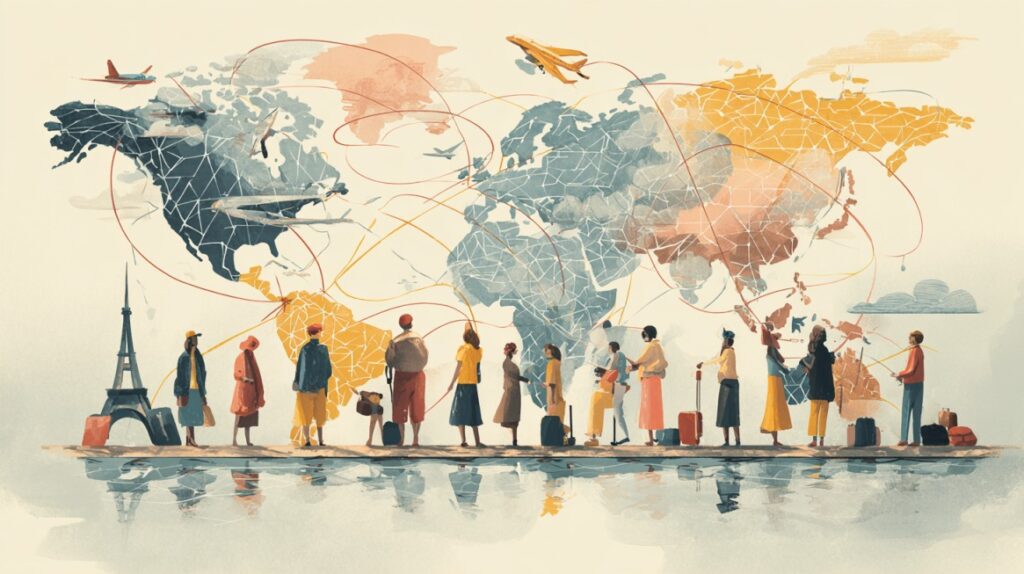
More and more young professionals are choosing to relocate overseas, drawn by career opportunities, cultural enrichment, and personal growth.
Moving to another country can be thrilling, but it also comes with challenges that require careful planning.
Success in a new environment depends heavily on preparation, a proactive mindset, and flexible strategies that allow adaptation to unexpected circumstances.
With the right approach, settling abroad can turn into a rewarding step toward a fulfilling global life.
Table of Contents
Before You Move: Mental & Logistical Preparation
Starting life abroad is not only about stepping into a new country, but also about building a foundation that supports long-term stability.
Careful preparation before departure makes the difference between an overwhelming transition and a manageable one.
Mental readiness, practical research, and strong financial planning work together to create confidence.

Planning ahead and decluttering before a move can reduce stress and save on relocation costs
Clarify Your Motivation
Knowing why the move is important creates clarity. Personal motivation acts as a compass that guides decisions when challenges arise.
Relocation driven by ambition, lifestyle choice, or the pursuit of personal growth usually results in more fulfilling experiences.
Escapism, on the other hand, only postpones existing problems that will eventually resurface. A strong purpose will help maintain resilience when facing cultural adjustment, career setbacks, or homesickness.
- Identify specific goals such as career advancement, cultural immersion, or lifestyle change.
- Ask honest questions: “Am I running toward something positive, or away from something unresolved?”
- Write down motivations to revisit them during difficult moments.
Research Your Destination Thoroughly
Each destination has advantages and limitations.
Conducting thorough research in advance prevents unnecessary surprises and allows realistic planning.
Paying attention to practical details provides a clearer view of daily life abroad.
- Cost of living: housing, groceries, utilities, and transportation.
- Safety: crime rates, political stability, and public security.
- Healthcare quality: accessibility of hospitals, cost of services, and availability of private health insurance for foreigners.
- Climate and environment: weather patterns, air quality, and pollution levels.
- Legal requirements: visa regulations, work permits, and residency conditions.
Digital resources such as Numbeo offer up-to-date comparisons that help evaluate affordability.
When possible, visiting the destination beforehand provides first-hand insight, allowing a short trial period before making a permanent commitment.
Plan Financially
Strong financial preparation ensures security during the adjustment period.
Unexpected costs often arise, and being ready reduces stress.
Planning ahead for both short-term expenses and long-term obligations is essential.
- Build an emergency fund: at least three to six months of living expenses.
- Understand taxation: learn about tax responsibilities in both home and host countries.
- Set up banking: open a local bank account and learn how exchange rates affect transactions.
- Consider digital nomad programs: some destinations offer special tax or residency options.
- Budget for hidden costs: health insurance, deposits, and initial setup expenses.
Making the Move: Practical Steps for a Smooth Transition

Using labels and an inventory list for boxes can make unpacking up to 50% faster
Relocating to another country requires careful planning once the decision has been made. Practical arrangements can determine how smooth the transition feels during the first few months.
Focusing on logistics such as moving services, relocation contracts, and housing ensures less stress and more confidence in settling.
Secure a Trusted Moving Company
Transporting personal belongings across borders is rarely simple.
- Customs paperwork
- Shipping timelines
- Potential mishandling
A company with international certifications like FIDI-FAIM usually provides higher accountability and structured processes.
Insurance options, customs duties, and packaging standards must be clarified before signing any contract.
Having a dedicated coordinator simplifies the entire experience and provides a reliable contact if problems arise.
- Look for international certifications such as FIDI-FAIM.
- Confirm what is included in the quote, especially insurance and customs clearance.
- Ensure professional packing standards to reduce the risk of damage.
- Ask for a dedicated coordinator to manage communication and logistics.
- Compare at least two or three companies for cost and reliability.
Negotiate Your Relocation Contract
Professionals moving for work often underestimate the power of negotiation.
Employers sometimes provide relocation packages that cover shipping, housing allowances, temporary accommodation, insurance, or flights.
Asking clear questions about what is offered prevents unpleasant surprises. Stronger relocation support directly influences productivity, as financial or logistical struggles can quickly create unnecessary stress.
Confidence in requesting improvements often results in better living conditions during the adjustment phase.

Over 60% of professionals who negotiate their relocation package receive additional benefits such as housing assistance or travel reimbursement
- Confirm shipping costs and storage support.
- Ask about temporary housing options and length of coverage.
- Clarify insurance details, including healthcare and travel coverage.
- Request financial support for flights or family relocation if applicable.
- Highlight how proper support allows faster integration and improved performance.
Choose the Right Housing
Daily life abroad begins with finding safe and suitable housing. Neighborhood choice affects comfort, expenses, and the ability to build a social network.
Affordability, safety, and access to public transportation or essential services should be evaluated.
Distance to the workplace or proximity to expat-friendly areas can influence how quickly a sense of stability develops.
Committing to a long-term lease without first experiencing the neighborhood is risky, so temporary housing is usually the wiser option until familiarity grows.
- Compare neighborhoods for affordability and safety.
- Check access to supermarkets, healthcare, and public transport.
- Consider commute time to work or coworking spaces.
- Seek short-term rentals first before committing long term.
- Ask locals or expat forums for honest feedback on different areas.
Settling In: Adapting to Your New Environment

Studies show it takes an average of 6 months for people to fully adjust and feel at home after moving to a new place
Adjusting to life in a new country does not end once the moving boxes are unpacked. The real test begins with integration into the local community and culture.
Success in this stage relies on communication, building relationships, and embracing new ways of living.
A smooth adaptation process provides the confidence to handle daily responsibilities while creating meaningful connections.
- Language
- Networking
- Cultural adjustment
Learn the Local Language
Language is one of the most powerful tools for integration.
Even basic efforts to learn local expressions demonstrate respect and openness toward the culture.
Apps, structured classes, and exchange meetups with locals provide different ways to practice.
Over time, language skills make it easier to handle practical tasks, form friendships, and feel a sense of belonging.
Build Your Network

Studies show that expats with strong social networks adapt 40% faster to life in a new country
Connections form the backbone of a fulfilling life abroad.
Expat forums, professional associations, coworking spaces, and volunteer opportunities create entry points for meeting others.
Building relationships with both locals and fellow foreigners provides balance, ensuring exposure to new perspectives while keeping supportive familiarity.
Seeking out mentors or industry peers can accelerate career growth and open new opportunities.
Embrace Cultural Differences
Every country has its own customs, humor, and social norms.
Culture shock is a natural experience, but approaching it with curiosity rather than resistance eases the transition.
Adopting flexibility, observing how locals interact, and learning what is valued socially reduces misunderstandings.
Growth often comes from leaving the comfort zone and adapting to a new rhythm of life.
Lifestyle & Emotional Resilience

Studies show that living abroad can significantly boost adaptability, problem-solving skills, and emotional resilience
Life abroad is not only about professional advancement or adapting to practical matters but also about maintaining balance, health, and emotional strength.
Without resilience, even the most well-prepared moves can feel overwhelming.
Creating a stable lifestyle requires conscious effort, as both mental and physical health are tested by new environments, unfamiliar cultures, and distance from loved ones.
Focusing on wellbeing, staying connected with home, and embracing new experiences ensures a more sustainable and fulfilling life abroad.
Prioritize Your Wellbeing
Health should always remain the foundation of a successful experience abroad. Establishing daily routines around sleep, nutrition, and exercise builds stability in an environment where much feels uncertain.
Something as simple as a morning walk, weekly meal planning, or setting a consistent bedtime can make a huge difference in stress management.
Emotional health is equally important, and seeking support through local community groups, counseling services, or mindfulness practices helps reduce isolation.
Recognizing early warning signs of homesickness, burnout, or anxiety allows intervention before they grow into bigger issues.
- Maintain consistent sleep schedules to support mental clarity
- Commit to regular physical activity for stress relief and energy
- Eat balanced meals instead of relying on quick or processed food
- Seek professional counseling or mental health services when needed
- Practice mindfulness or relaxation techniques such as meditation or yoga
Stay Connected to Home
Distance does not need to create disconnection. Maintaining strong ties with family and friends back home provides emotional stability and comfort during challenging times.
Regularly scheduled video calls, group chats, or even old-fashioned letters keep relationships alive.
Planning trips back home when possible also creates milestones to look forward to, easing feelings of distance.
Sharing achievements, struggles, and daily experiences helps loved ones remain part of life abroad, which in turn prevents the sense of being cut off.
- Schedule regular video calls with family and friends
- Share updates, photos, and stories to maintain involvement
- Use group chats or social platforms to stay in touch daily
- Plan occasional visits home to recharge emotionally
- Include loved ones in small milestones to strengthen ties
Explore and Enjoy Your New Life
Thriving abroad requires more than survival—it involves finding joy and purpose in the experience.
Engaging with local culture through food, festivals, art, and traditions creates meaningful memories.
Weekend trips within the host country reveal different regions, while joining cultural events introduces new perspectives..
Challenges encountered along the way become learning moments, building confidence and adaptability.
- Attend cultural festivals, concerts, and community events
- Try local cuisine to connect with traditions and flavors
- Take short trips within the country to discover new places
- Engage in hobbies or sports popular in the host culture
- Document experiences through photos, journaling, or blogging
The Bottom Line
Starting a new life abroad requires courage, preparation, and determination. Challenges will arise, yet they can be managed with strategy and resilience.
Proper planning, a willingness to adapt, and consistent effort allow young professionals to thrive in a global environment.
Building a secure financial plan, researching essential details like visas and healthcare options and staying committed to personal growth transform the move into a truly rewarding chapter of life.







